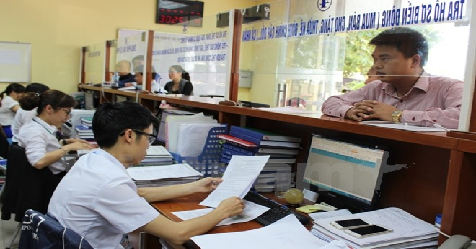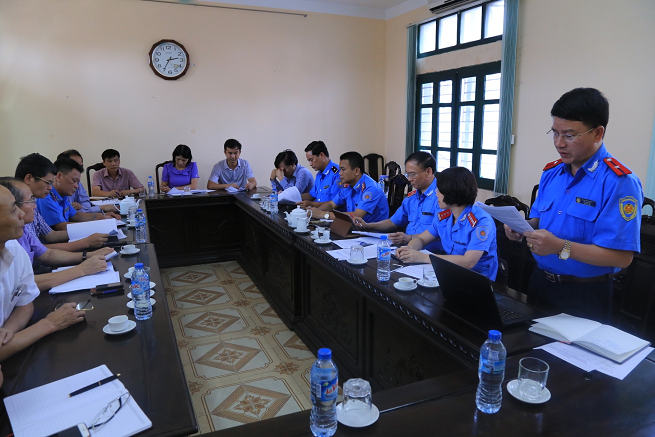At the end of 2019, the Ministry of Home Affairs of Vietnam promulgated Circular 13/2019/TT-BNV to replace Circular 06/2012/TT-BNV regarding commune-level officials and part-time personnel at the commune level, in villages, and residential groups.

Illustrative Image
According to Circular 13/2019/TT-BNV, there are several new points that all commune-level officials in Vietnam need to know, as follows:
1. Commune-level officials in Vietnam are required to have a university degree or higher
Previously, Point c, Clause 1, Article 2 of Circular 06/2012/TT-BNV required the professional qualification standards for commune-level officials to be graduation from a professional secondary school or higher in a field of study appropriate to the position held. However, according to Point c, Clause 1, Article 1 of Circular 13/2019/TT-BNV, from December 25, 2019, commune-level officials are required to graduate from university or higher in a field of study appropriate to the job requirements of each specific position for commune-level officials.
Additionally, the IT qualification must also be upgraded to a certificate of basic IT skills according to the standards set in Circular 03/2014/TT-BTTTT (previous regulations required only an office IT certificate level A or higher).
It is evident that with the development of society, elevating the mandatory standards for commune-level officials is necessary in the current situation.
2. A 5-year period for commune-level officials in Vietnam to meet standards
Circular 13/2019/TT-BNV states that the regulations in Decree 34/2019/ND-CP and this Circular form the basis for provincial and district-level People's Committees to organize planning, resource creation, training, fostering, recruitment, implementation of policies, or streamline staffing.
For officials recruited before the effective date of Circular 13 who do not meet the standard according to Clause 1, Article 1 of Circular 13, within 5 years from the effective date of this Circular, they must meet the standard as prescribed.
3. Five policies for surplus commune-level officials in Vietnam
If commune-level officials do not meet the standards under Article 1 of Circular 13/2019/TT-BNV, the district-level People's Committee Chairman will summarize and propose to the provincial-level People's Committee Chairman to carry out the following:
- Streamlining staffing according to Decree 108/2014/ND-CP and Decree 113/2018/ND-CP;
- Resolving resignation policies according to the provisions of Law on Officials 2008;
- Resolving early retirement; retirement pending age of retirement according to regulations in Decree 26/2015/ND-CP;
- Transferring, supplementing to other communes, wards, or commune-level towns within the same district or to a different district within the same province;
- Converting to a official position at the district level or higher according to the provisions of Decree 161/2018/ND-CP.
4. No distinction between regular and in-service degrees when recruiting commune-level officials in Vietnam
Article 3 of Circular 13/2019/TT-BNV dictates that the conditions for registering to recruit commune-level officials are to be implemented according to Article 6 of Decree 112/2011/ND-CP. Therein, there is no distinction between types of training, public or non-public schools.
Additionally, Article 2 of Circular 27/2019/TT-BGDDT prescribes the content recorded on university degrees to eliminate the form of training.
Therefore, legal documents are consistent in not distinguishing between regular and in-service training forms, aiming to create fairness for learners.
5. Commune-level officials to be assigned additional personnel in Vietnam
According to the regulations, each commune-level official position is to be staffed by 01 person or more. However, Circular 13 has changed this as follows: “Provincial People's Committees regulate the increase in personnel for certain commune-level official positions appropriate to the requirements, tasks of each commune, ward, and commune-level town (excluding the positions of Commune Police Chief and Commander of the Commune Military Command).”
The 5 positions that can be assigned additional personnel include:
- Office – Statistics;
- Land Administration – Construction – Urban and Environment (for wards, commune-level towns) or Land Administration – Agriculture – Construction and Environment (for communes);
- Finance – Accounting
;- Justice – Civil Status;
- Culture – Society.
When assigning additional personnel for each position, it “must not exceed the total number of commune-level officials prescribed in Clause 1, Article 4 Decree 92/2009/ND-CP, as amended and supplemented in Clause 1, Article 2 Decree 34/2019/ND-CP”, specifically:
- Type 1 commune: Maximum 23 persons;
- Type 2 commune: Maximum 21 persons;
- Type 3 commune: Maximum 19 persons.
6. Only one case is exempt from examination when recruiting commune-level officials in Vietnam
According to Decree 112/2011/ND-CP and Circular 13/2019/TT-BNV, the cases of recruiting commune-level officials without examination include:
- Individuals who graduate with excellence from domestic universities or with distinction from foreign universities;
- Public employees in public service providers with at least 5 years (60 months) of service, counted from the time of recruitment as a public employee (excluding probation period);
- Individuals on payroll in the armed forces (military, police) and those working in cryptography, with at least 5 years (60 months) of service in the armed forces (military, police) or working in cryptography, counted from the time of official recruitment into the military, police or organizations of the cryptographic forces;
- Commune-level officials who resign from their positions, provided they meet the conditions for commune-level officials, and there are available positions for commune-level officials.
Clause 4, Article 6 of Circular 13/2019/TT-BNV prescribes that when recruiting commune-level officials without examination, the district-level People's Committee Chairman must establish an examination and evaluation council, except for cases where the individual was a commune-level official before being elected to a commune-level official position.
Le Hai
 Article table of contents
Article table of contents
![[InfoGraphic] 6 forms of discipline for officials and public employees under Decree 71/2016/ND-CP](https://cdn.lawnet.vn//uploads/NewsThumbnail/2016/07/12/1319291-01.png)









.Medium.png)
.Medium.png)
.Medium.png)
.Medium.png)
